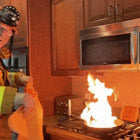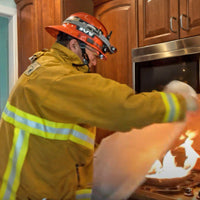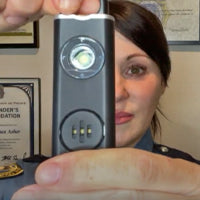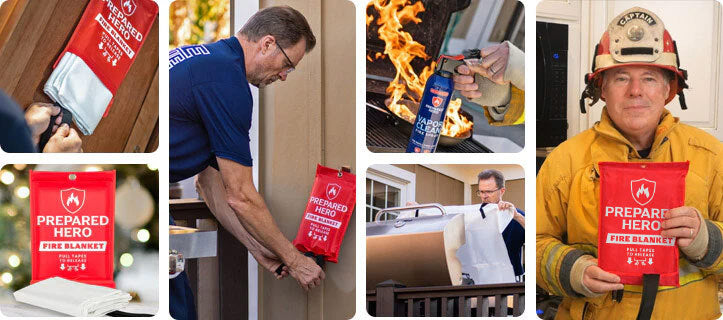Where you put your smoke detectors matters just as much as installing them. Proper placement makes sure they can detect...
According to the National Fire Protection Association (NFPA), fire death rates are 60% lower in homes with working smoke alarms compared to those with zero or non-working smoke detectors. While smoke detectors help, they can be annoying when they beep out of nowhere.
If you have a smoke detector that won’t stop beeping after replacing the battery, you know how frustrating it is. But why is your smoke detector beeping with a new battery? Is it something minor or serious? What can you do to fix it? Let’s get to the bottom of it so you can get some peace and quiet.
How Do Smoke Detectors Work?

Smoke detectors are one of the most crucial safety features in your home. They’re designed to detect smoke particles in the air, and when they do, they sound the alarm to warn you about a potential fire. The idea is simple: if there’s smoke in the air, there’s a fire somewhere, and the smoke detector warns you.
There are two main types of technology used in smoke alarms: ionization and photoelectric. Both are effective, but they work in different ways.
Let’s start with ionization technology. They use a small amount of radioactive material that ionizes the air inside the detector. The said material creates a small electric current between two metal plates. When smoke particles enter the chamber, they disturb the current because they attract and carry away some ions. The alarm goes off if enough particles enter and reduce the current below a certain point. It sounds technical, but the important thing to know is that these detectors work well at spotting fires that produce small, fast-moving particles like black soot. On the downside, they’re sensitive to things like bathroom steam or cooking fumes.
On the other hand, photoelectric technology uses light. Detectors that use them have light beams inside the sensing chamber. The light doesn’t hit the detector when there are no smoke particles. But when smoke particles are in the air, they scatter the light and reflect it to the sensor. When enough light is reflected, the alarm sounds. These alarms are better at detecting slow-burning, smoldering fires that produce larger, lighter particles. They’re also less likely to go off from everyday kitchen smoke or dust.
While both technologies detect smoke, they have their strengths and weaknesses. Ionization smoke alarms detect flaming fires more quickly, while photoelectric alarms are more sensitive to the smoke from smoldering fires. That’s why experts recommend having both technologies at home. Some smoke detectors even combine ionization and photoelectric technologies into one unit.
Why Do Smoke Detectors Beep?

Ever wondered why your smoke detector keeps beeping? Whether it's a fire, a low battery, or dust buildup, your smoke detector is constantly looking out for your safety. Find out why they beep below:
There Is a Fire
The first reason why a smoke detector beeps is it has detected smoke or fire. Smoke triggers the sensor inside the detector, which sets off the alarm to warn everyone nearby. The sensor could detect visible smoke or tiny particles from a fire with little smoke.
In this case, the beeping is an emergency signal, so you should immediately check your surroundings for signs of fire or smoke. Once you confirm the fire, act quickly and get your fire blanket or fire spray. Even small fires can spread fast, so don’t ignore the warning.
Malfunction
Smoke detectors sometimes beep because they're malfunctioning. If something’s damaged, the alarm might go off unexpectedly. This could be due to internal wiring issues, a faulty sensor, or an error in the alarm system. If your detector keeps beeping even when there’s no smoke or fire, something's probably wrong with the unit.
You can reset it, but if the problem persists, ask a professional to take a look. Don’t ignore a malfunction because it leaves you defenseless against fire.
Low Battery
One of the most common reasons for a beeping smoke detector is a low battery. When the battery runs low, the detector beeps intermittently to let you know it needs a replacement. It’s a good way to make sure your detector keeps working, but it can be frustrating sometimes.
Most of the time, the beeping will stop after you replace the battery. If you have a hard-wired smoke detector that keeps beeping without fire, its backup battery needs to be changed. Replace the battery as soon as possible to keep your home and loved ones safe. It’s a simple fix that prevents the detector from being silent when you need it most.
Power Interruption
A power interruption can also cause a smoke detector to beep. If there's a sudden loss of power or if the detector is disconnected from the main electrical supply, it may beep to signal that it’s not getting enough power to function.
This could happen due to an electrical outage, a tripped circuit breaker, or a problem with your house’s wiring. There's usually no issue if the beeping stops once the power is restored. But if the beeping continues, contact a professional to make sure the unit is properly connected. Remember, it's better to be safe than sorry.
Dust Buildup
Smoke detectors can beep when dust builds up in the sensor area. Over time, dust or dirt can accumulate on the sensor. This causes your smoke detector to beep randomly. If you’ve recently done any cleaning or cooking, or if the detector is near a dirty area, dust or dirt might be the cause.
Cleaning the detector gently with a vacuum or a soft brush clears the buildup and stops the beeping. Neglecting this maintenance could lead to unnecessary beeping or missed alarms during a fire.
Old Age
Like any electronics, smoke detectors don’t last forever. According to experts, smoke alarms should be replaced every ten years. As the device ages, its components can wear out, causing it to malfunction or beep out of the blue.
When a detector reaches the end of its life, it may beep to warn you it’s time for a replacement. If your smoke detector is over ten years old, replace it as soon as possible. This ensures your home is protected by a reliable safety device. In addition, old smoke detectors may not meet current safety regulations, so replacing them lets you comply with the law.
What Smoke Detector Beeps Mean

The beeps from your smoke detector are its way of communicating with you. Understanding what each type of beep means helps you respond properly. Here’s a breakdown of the most common smoke detector beeps and what they mean:
Continuous Beep
A continuous, loud beeping sound is usually the most urgent beep from your smoke detector. This pattern means that the detector has detected smoke in the area. If you have a single smoke alarm, the smoke is likely close to that device. If you have interconnected alarms, the smoke could come from any detector. It means there’s likely a fire, so you should immediately check your home for smoke or flames. Even if you suspect the alarm was triggered by something like burnt food, it’s always safer to check. If you confirm there’s a fire, try to put it out only if it’s safe. Otherwise, evacuate your house and call the fire department.
Single Beep
Single beeps that are 30 seconds to a minute apart usually signal the battery in your smoke detector is low and needs to be replaced. It reminds you to monitor the battery because a smoke detector without a working battery can’t protect you in an emergency.
A single beep could also indicate other issues. For one, dust or dirt buildup inside the sensor can trigger it. Your alarm could also be malfunctioning or reaching the end of its life. If your smoke detector emits single beeps, try replacing the battery first. If the beeping doesn’t stop afterward, check for dust inside. If there’s no dust or dirt buildup, check if your alarm is malfunctioning or near its expiration date.
Multiple Beeps
Multiple beeps could mean different things, depending on the type of smoke detector. If you have a combination smoke and carbon monoxide detector, multiple beeps could indicate that carbon monoxide or smoke levels are rising. Some detectors beep multiple times to signal the unit has reached its end of life. Multiple beeps could mean smoke if your detector is part of an interconnected system. Always refer to your specific smoke detector manual to understand the exact meaning of multiple beeps.
Irregular Beeping
Sometimes, your smoke detector might beep irregularly, which could be caused by temperature fluctuations. If the detector is near an open window, ceiling fan, or vent, temperature changes may interfere with its ability to detect smoke properly. This can lead to random beeping that’s not related to a fire. If this happens, try moving the smoke detector to a different location or make sure it's not exposed to extreme temperature changes.
Loud and Fast Beeps
Loud, fast beeping is the most common sound for when there’s an actual fire. This is the alarm’s way of urgently warning you about smoke and/or flames. Even if you don’t see any signs of a fire, don’t ignore this sound. Check your surroundings to make sure there’s no fire. If you find smoke or flame, get a fire blanket, fire spray, or fire extinguisher and put it out. If you don’t feel safe or confident, leave your house and call the authorities immediately.
Why Is Your Smoke Detector Beeping With a New Battery?

Your smoke detector is beeping with a new battery for many reasons.
One of the most common reasons is dust buildup. Over time, dust, dirt, and even tiny insects can make their way into the sensor. You can try cleaning your smoke detector by gently vacuuming it or using compressed air.
Another possible reason is that the smoke detector is malfunctioning. An old unit won’t likely work even with a new battery. Many smoke detectors last for up to ten years, and once they’re near the end of their lifespan, they beep irregularly. If your smoke alarm is over ten years old, replace it. If it's under ten years old and beeping with a new battery, check for any damages.
It’s also worth noting that some smoke detectors will beep intermittently to indicate the battery isn’t working or properly installed. Double-check that the new battery is properly placed in the compartment. If it's loose or not aligned, the detector will usually beep.
In other cases, it's just a matter of the alarm being in a reset mode after you replace the battery. In some cases, pressing and holding the test/silence button for 20 seconds helps reset the system and stop the beeping.
Types of Smoke Detectors

All working smoke alarms can detect fires, but not all are created equal. Knowing which one works best for your home is a must. Here are the types of smoke detectors you can choose from:
Photoelectric Smoke Detectors
Photoelectric smoke alarms work best at detecting smoldering fires, which often burn slowly and produce lots of smoke but little flame at first. They work by shining a light into a chamber. When smoke enters the chamber, it scatters the light, and the sensor picks up the change. This triggers the alarm.
The biggest benefit of photoelectric detectors is that they’re not easily triggered by harmless things like cooking fumes and bathroom steam. This makes them a good choice for kitchens and bathrooms, where other detectors might go off for no reason. They’re also effective at detecting fires in their early stages, giving you more time to respond.
Ionization Smoke Detectors
Ionization smoke alarms are better at detecting flaming fires that spread quickly and produce large, fast-moving flames. These detectors use a small amount of radioactive material between two charged plates, which ionizes the air. When smoke enters the chamber, it disrupts the ion flow and activates the alarm.
Ionization alarms are usually more affordable than photoelectric ones and respond more quickly to flaming fires. However, they’re more sensitive to smaller particles. This means they’re more likely to go off because of cooking smoke, dust, or shower steam. Hence, they’re best for living areas and bedrooms. However, they’re not the best choice for kitchens and bathrooms, where smoke and steam are always present.
Combination Smoke Detectors
As the name suggests, combination smoke detectors use photoelectric and ionization technologies. This lets them detect smoldering and flaming fires and offer more comprehensive coverage.
These detectors are ideal for homes that want the best of both worlds. They’re great for larger homes with different fire risks in various rooms. Some combination detectors even include carbon monoxide detection, which is a bonus. While combination detectors are more expensive than photoelectric or ionization alarms, they offer better coverage.
Combination detectors are a solid option if you’re looking for overall coverage throughout your home, especially in multi-story houses. Whether it's the kitchen, living room, or bedroom, a combination detector can handle different fire risks.
How Do You Reset a Smoke Detector After Replacing the Battery?

First, disconnect all power sources. If it’s a hard-wired alarm, disconnect it from any wiring. If it’s a plug-in alarm, unplug it from the outlet. Then, press and hold the test button for about 20 seconds. Holding it down helps reset the system and clear any error signals or residual charge. Once done, reconnect the power. If it’s a hard-wired alarm, reconnect it to the wiring. Otherwise, plug it back into the outlet. Your smoke detector should now be reset.
After resetting, test the smoke detector by pressing the test button again. If it still chirps or doesn’t function correctly, you might need to check for other issues or replace the smoke alarm.
How Do You Stop a Hardwired Smoke Detector From Beeping?

You can stop a hard-wired smoke detector from beeping by resetting or silencing it, depending on the cause. First, try pressing the test/silence button on the alarm. If it’s a low battery or minor issue, the beeping might stop. If that doesn’t work, reset the unit.
Do this by turning off the power source. Once the power is off, press and hold the test button. Then, turn the power back on. If the issue persists, check if your smoke detector is over ten years old. If not, call a technician to check your alarm for internal problems.
Why Is My Hard-Wired Smoke Alarm Beeping Every 30 Seconds?

Smoke alarms make different sounds to warn you of various issues. If your hard-wired smoke alarm beeps every 30 seconds, this usually means the battery is low, the sensors are dirty, or the unit needs to be replaced. Regularly test and clean your smoke alarm to prevent unnecessary beeping. Find out the other reasons why your hard-wired smoke detector beeps here.
How Long Does It Take for a Smoke Detector to Reset Itself?

It takes five to ten minutes for a smoke detector to reset itself. The exact time for a smoke detector to reset depends on why it went off. If it was triggered by smoke or a fire, it will usually start resetting itself once the smoke clears. This could take a few minutes. If it went off because of dust, steam, or cooking fumes, it might take a little longer for it to reset.
Conclusion
Understanding why your smoke detector is beeping with a new battery lets you fix the root issue as soon as possible. Whether it's dust buildup or malfunctioning batteries, figuring out the cause ensures that your smoke detector is always ready to protect you.
But smoke detectors alone aren’t enough to fully protect your home. You need additional prevention tools like fire blankets and fire sprays as well. They let you put out fires quickly and keep your loved ones safe.
Do you want reliable, easy-to-use, and affordable tools to put out small fires before they become raging infernos? Check out Prepared Hero’s fire prevention tools here, and get up to 51% off on certain items. Stay prepared, hero!


 Fire
Fire Safety
Safety Survival
Survival Protection
Protection New
New Scouting America
Scouting America
 Fire
Fire Safety
Safety Survival
Survival Protection
Protection New
New












